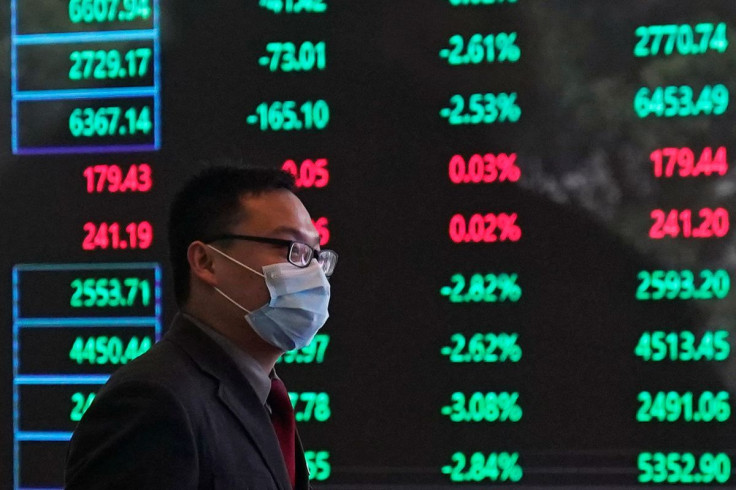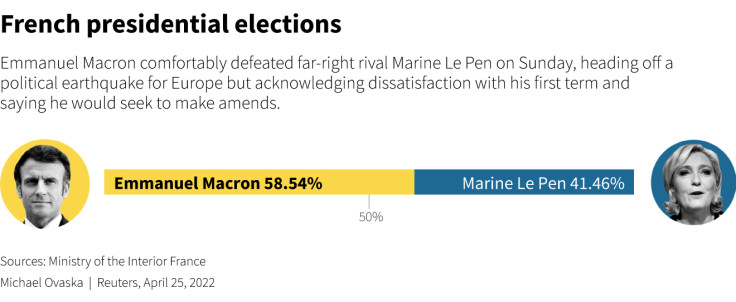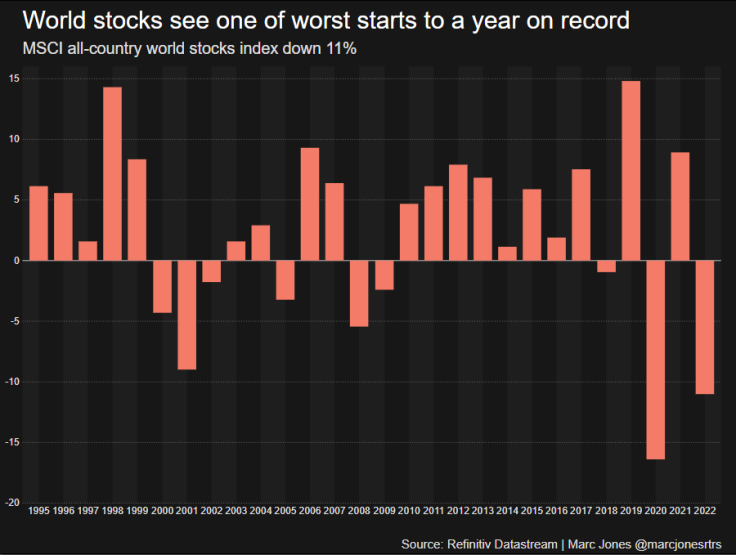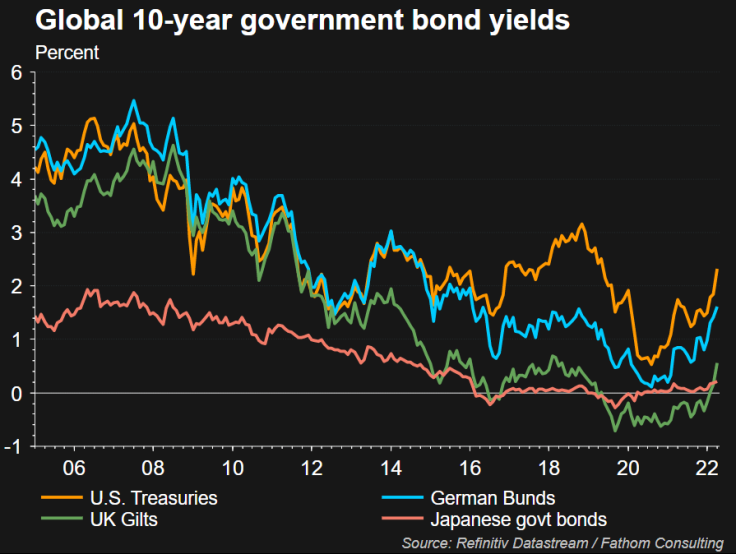Fears Of Global Slowdown Hit Global Equities, Commodity Prices

Wall Street shares were mixed, European stocks slid to a one-month low and commodity prices dropped on Monday on renewed concerns about rising global interest rates and China's spluttering economy.
Fears over China's COVID-19 outbreaks spooked investors already worried about faster U.S. interest rate hikes denting economic growth. U.S. shares were lower, extending last week's sharp declines and the CBOE Volatility index known as Wall Street's fear gauge, hit the lowest level since mid-March.
Europe's STOXX 600 index dropped 1.8% to close at its lowest since mid-March. Commodity stocks slumped 6%, as the global worries overshaddowed relief from French presidential results which saw Emmanuel Macron ease past far-right challenger Marine Le Pen on Sunday. [.EU]
Asian markets had suffered their worst day in over a month overnight on fears that Beijing was about to go back into a COVID-19 lockdown.
The Dow Jones Industrial Average rose 68.78 points, or 0.2%, to 33,880.18, the S&P 500 lost 3.62 points, or 0.08%, to 4,268.16 and the Nasdaq Composite added 84.38 points, or 0.66%, to 12,923.67 by 2:36 p.m. EST (1836 GMT).
"Stocks' rebound from the first quarter correction has hit a wall of rising long-term interest rates," Morgan Stanley's Chief Investment Officer Lisa Shale said in a note.
"With the Fed talking about a faster and larger balance sheet reduction than anticipated, real yields are approaching zero from their deeply negative territory. With the nominal 10-year U.S. Treasury cracking 2.9%, the equity risk premium
has plummeted."
MSCI benchmark for global equity markets fell 0.85% to 665.95. Emerging markets stocks fell 2.59%.
The euro slid 0.89%, near the session's trough and its weakest level since the initial COVED panic of March 2020.
"The reality is there is more to the French election story than Macron's win yesterday," said Rabobank FX strategist Jane Foley.
Not only are there parliamentary elections still to come in France in June, but Macron also seems likely to keep the pressure up for a Europe-wide ban on Russian oil and gas imports, which would cause serious economic pain, at least in the short term.
"We had German officials saying last week that if there was an immediate embargo of Russian energy then it would cause a recession in Germany. And if there was a recession in Germany, that would drag the rest of Europe down and have knock-on effects for the rest of the world," Foley said.
(Graphic: FRANCE-ELECTION French presidential elections,

)
Beijing worries saw the yuan skid to a one-year low. China stocks saw their biggest slump since the pandemic-led panic-selling of February 2020. [.SSE]
State television in China had reported that residents were ordered not to leave Beijing's Chatoyant district after a few dozen COVID cases were detected over the weekend.
The dollar index rose 0.613% and climbed unhindered to a two-year high. It touched a peak of $1.0695 against the euro. [FRX/]
Much focus was on how fast and far the Federal Reserve will raise U.S. interest rates this year and whether that, along with all the other current global strains, will help tip the world economy into recession.
This week is also a packed one for corporate earnings. Almost 180 S&P 500 index firms are due to report. Big U.S. tech will be the highlight, with Microsoft and Google on Tuesday, Facebook on Wednesday and Apple and Amazon on Thursday. [.N]
In Europe, 134 of the Stoxx 600 will also put out results, including banks HSBC, UBS and Santander on Tuesday, Credit Suisse on Wednesday, Barclays on Thursday and NatWest and Spain's BBVA on Friday. [.EU]
"I wonder whether just meeting expectations will be enough, it just feels like maybe we'll need a bit more," said Rob Carnell, ING's chief economist in Asia, referring to jitters about big tech following a dire report from Netflix last week.
(Graphic: World stocks suffering one of worst ever starts to a year,

)
FEAR FACTOR
Twitter shares rose amid reports the company was set to accept Tesla-owner Elon Musk's offer to buy the microblogging site. Twitter was poised to agree to a sale to Musk for around $43 billion in cash, people familiar with the matter said.
Monday's earlier selloff in Asia also saw Hong Kong's Hang Seng fall 3.7% and the Shanghai composite index slide over 5% [.SS].
China's central bank had fixed the mid-point of the yuan's trading band at its lowest level in eight months, seen as an official nod for the currency's recent slide, and the yuan was sold further, to a one-year low of 6.5092 per dollar.
The higher dollar pushed spot gold <XAU=> 1.47% lower. U.S. gold futures settled nearly 2% lower at $1,896. Palladium prices shed nearly 13% on worries over a hit to Chinese demand.
Elsewhere in commodities, Brent crude closed 4% lower at $102.32 a barrel and U.S. crude settled down 3.5% at $98.54, its first close below $100 since April 11. [O/R]
Euro zone bond yields were also down.[GVD/EUR][US/]
Money markets are now pricing in a 1 percentage point increase in U.S. interest rates at the Federal Reserve's next two meetings and at least 2.5 points for the year as a whole, which would be one of the biggest annual increases ever.
This week will also see the release of U.S. growth data, European inflation figures and a Bank of Japan policy meeting, which will be watched for any hints of a response to a sharp fall in the yen, which has lost 10% in about two months.
(Graphic: The only way is up!,

)
© Copyright Thomson Reuters 2024. All rights reserved.




















